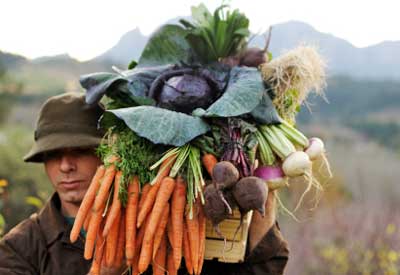Your friendly and optimistic Planet Natural Blogger has more than once declared — rather grandly — that organic gardening can save the world.
Actually, it might take a little more than that, though local, personal and sustainable organic food production is playing a huge role in human health and the conservation of our resources. Many of us — suspicious of agribusiness, unhappy with the poisoning of our environment in the name of corporate food production, upset with private control of energy sources, and wishing independence from as many facets of wasteful consumerism as possible — want to take charge of our own sustenance and well-being. The permaculture gardening movement, dedicated to natural ecosystems, small-scale sustainable food and energy production, and ecologically-friendly living spaces, is that larger picture.

100% ALASKA HUMUS
Ancient Forest Humus
Contains pure, naturally decomposed forest humus -- NO fillers or additives.
$16.95Learn moreGet your gardens off to a great start and keep them productive with premium quality soil amendments. Need advice? Our Soils Blog provides the ideas, information and practical experience you need to get the job done right. Now, let’s grow!
The movement whose various components date back decades and across cultures became a fully realized philosophy in the early 1970s when Bill Mollison and David Holmgren, in reaction to what they say as an over reliance on nonrenewable resources and the destruction of soils by the agricultural-industrial complex, collected their thought in the now landmark book Permaculture One. Since then the philosophy has expanded and its practices refined. It now embraces gardens, housing and all the various aspects of their design, including aquaculture, forest farming, and solar utilization.
Peter Bane’s new book The Permaculture Handbook: Garden Farming for Town and Country is a big, detailed compendium of the applications of permaculture philosophy (David Homgren wrote its foreword). It’s basically a textbook of “garden farming,” a term Bane defines, at its simplest, “no more than the efforts of people to provide for their own needs from their immediate surroundings.” Holmgren’s original 12 principles of permaculture — all are worthy but our favorite is #3 “Get a yield (or harvest)” — are restated, explained, and then put to work.
Bane — in over 450 pages — shows the practical application of these principles, starting with design — an important facet of permaculture — right down to how to reduce odors from you chicken pen (which in the inter-related world of permaculture is a source of sustenance for your family and your garden soil). There are directions for building root cellars, plans for collecting rainwater, ways to incorporate food raising into natural landscapes, and tips for reclaiming spent soil. Of course, organic gardening plays a central role. And Bane doesn’t ignore city dwellers. He cites examples of how urban and suburban spaces can best be utilized for sustenance.

Even if you’re not completely committed to the permaculture lifestyle — and it is a lifestyle — you’ll find plenty here that can be applied to your backyard garden or to the design of your landscape. Maybe you don’t have the time or space for raising lettuce in “beds” floating in a constructed pond where trout produce meat and fertilizer. On the other hand, you might find aquaculture a fascinating and rewarding challenge. But you will find suggestions to make your garden water use more efficient as well as a host of other practical applications. As your sometimes perceptive and always realistic PN Blogger believes: each small step in sustainable, organic gardening, done with our own and our family’s well-being in mind, contributes to the saving of the planet.











